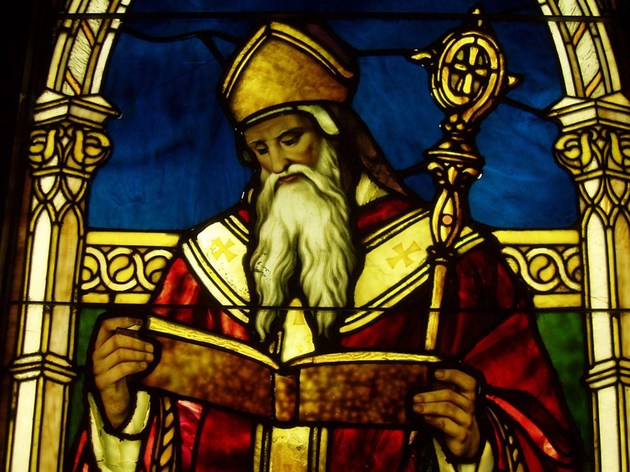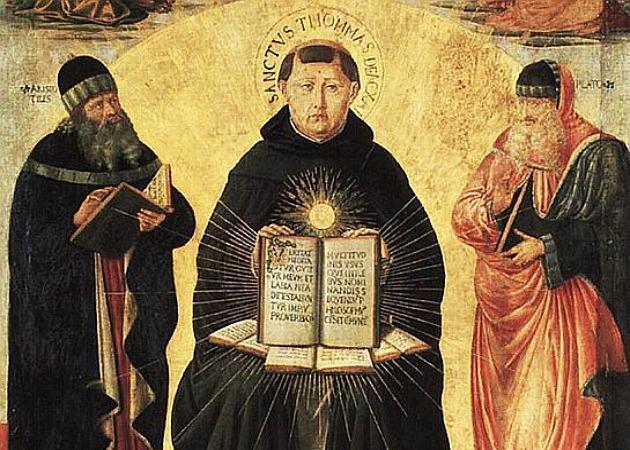The medieval philosophy was developed in Europe during the Middle Ages (V-XV centuries). It is a period of expansion and consolidation of Christianity in Western Europe.
Medieval philosophy tried to reconcile religion with philosophy, that is, Christian consciousness with philosophical and scientific reason.
This may seem paradoxical in our time, but at that time it was perfectly understandable.
Features: Summary
The main characteristics of medieval philosophy are:
- Inspiration in classical philosophy (Greco-Roman);
- Union of Christian faith and reason;
- Use of concepts from Greek philosophy to Christianity;
- Search for divine truth.
Many philosophers of that time were also part of the clergy or were religious. At that time, the major points of reflection for scholars were: the existence of God, faith and reason, the immortality of the human soul, salvation, sin, divine incarnation, free will, among other issues.
Thus, the reflections developed in the Middle Ages, although they could contemplate scientific studies, could not be opposed to the divine truth reported by the Bible.
Periods of Medieval Philosophy and Main Philosophers
The object of study of medieval philosophy began before this chronological period in history. After all, after the death of Jesus Christ, the first Christians had to reconcile Greek philosophy with Christian teachings.
Since the Middle Ages was a long period in Western history, we divided Medieval Philosophy into four phases:
- Philosophy of Apostolic Fathers;
- Philosophy of Apologist Fathers;
- Patristic;
- Scholastic.
Patristic and scholastic philosophy, which correspond to the last two periods, were the most important in medieval philosophy.
Philosophy of Apostolic Fathers
In the 1st and 2nd centuries, the philosophy developed was related to the beginning of Christianity and, therefore, the philosophers of that period were concerned with explaining the teachings of Jesus Christ in a pagan environment.
It receives this name since this early Christianity was based on the writings of several apostles.
The greatest representative of that period was Paul of Tarsus, the Apostle Paul, who wrote many epistles included in the New Testament.
Philosophy of Apologist Fathers
In the 3rd and 4th centuries, medieval philosophy passed into a new phase related to apology. This was a figure of rhetoric that consisted of defending some ideal, in this case, the Christian faith.
The “Apologistic Fathers” used the same figures of speech and arguments to dialogue with Hellenists. Thus, he defended Christianity as a natural philosophy that would be superior to Greco-Roman thought.
In this way they brought Greco-Roman thought closer to Christian concepts that were spreading throughout the Roman Empire .
During this period, Christian apologists stand out: Justino Martyr, Origen of Alexandria and Tertullian.
Patristic Philosophy

Patristic philosophy was developed from the 4th century and remained until the 8th century. It receives this name because the texts developed in the period were written by the so-called “Fathers of the Church” ( Pater , “father”, in Latin).
Patristics was concerned with adapting the teachings of Greek philosophy to Christian principles. It was based on the works of Plato and identified the Word of God with the world of Platonic ideas. They assumed that man would be able to understand God through his revelation.
This is an early stage of the development of medieval philosophy, when Christianity is concentrated in the East and is expanding throughout Europe. For this reason, most philosophers were also theologians and the main theme was the relationship of reason and faith.
The Fathers of the Church needed to explain concepts like immortality of the soul, existence of one God, and dogmas like the Holy Trinity, starting from Greek philosophy.
Among the Fathers of the Church are Saint Irineu de Lyon, Saint Ignatius of Antioch, Saint John Chrysostom, Saint Ambrose of Milan, among many others.
The most prominent philosopher of the period, however, was Saint Augustine of Hippo .
Scholastic Philosophy
Based on Aristotle’s philosophy , Scholasticism was a medieval philosophical movement that developed during the 9th and 16th centuries.
It arises in order to reflect on the existence of God, the human soul, immortality. In short, they wish to justify faith from reason.
Therefore, the scholastics maintained that it was possible to know God through empiricism, logic and reason.
Scholastics also intends to defend the Christian doctrine from the heresies that appeared and threatened to break with the unity of Christianity.
Great scholastic philosophers were Saint Bernard of Claraval, Pedro Abelardo, Guilherme de Ockham, the blessed João Duns Escoto, among others.
During this period, the most important philosopher was São Tomás de Aquino and his work “Summa Teológica” , where he establishes the five principles to prove the existence of God.
Scholasticism remained in force until the Renaissance, when the Modern Age begins.

